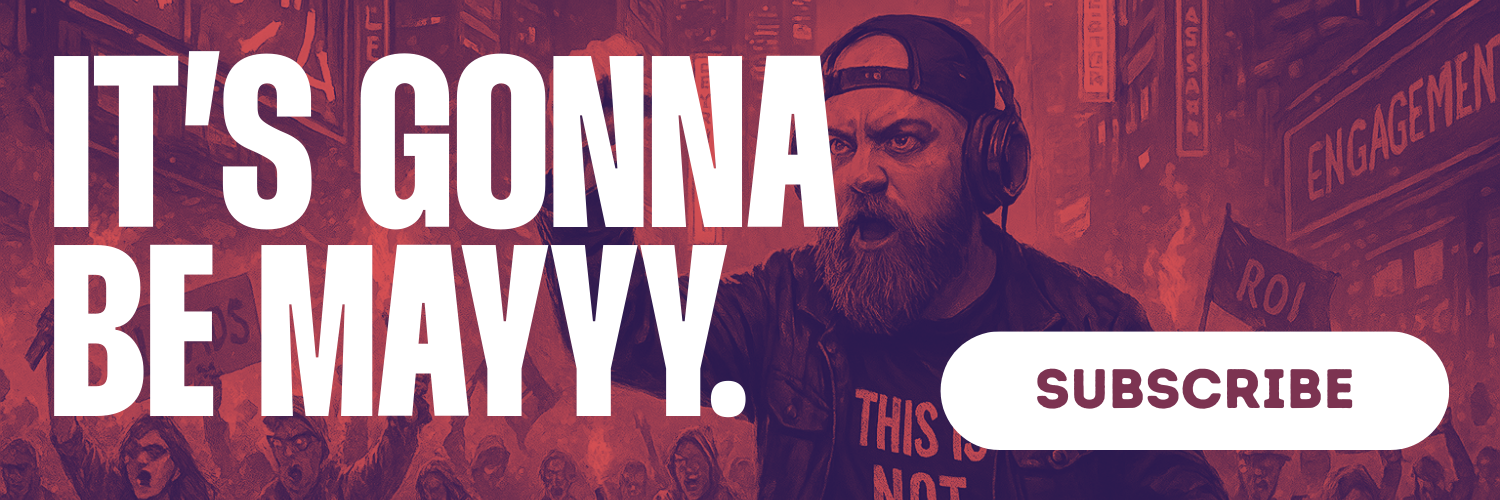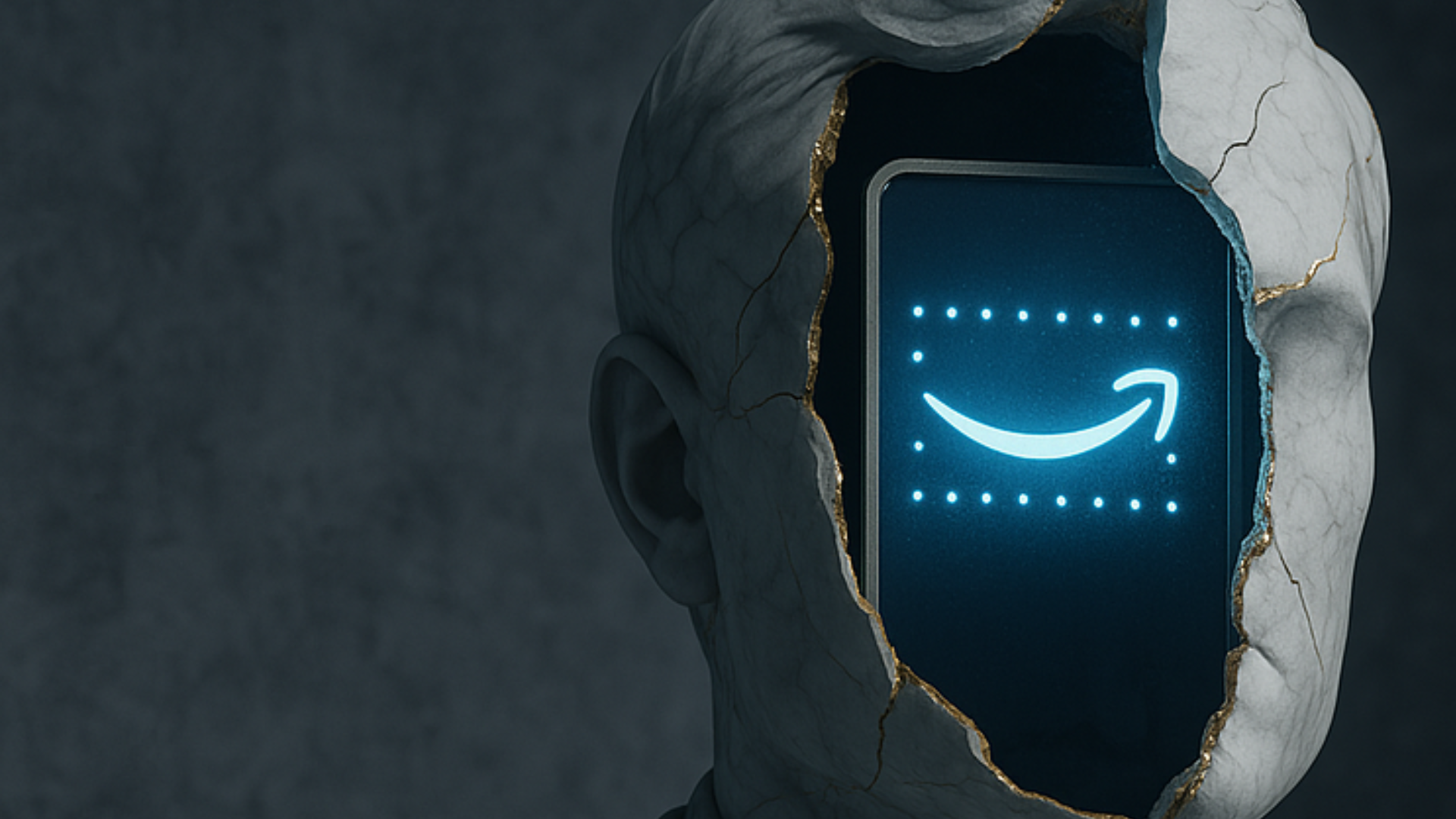On April 10, 2025, Udi Ledergor released a book titled Courageous Marketing: The B2B Marketer's Playbook for Career Success.
It was self-published under the imprint "Actionable Ideas Press," a name that exists nowhere in any state registry, has no business filings, no trademark protections, and no existence beyond a website built on Webflow with a P.O. Box listed in San Francisco.
In other words: it’s a front.
A shell. A moniker made to look like a publishing house, but in reality, it's just Udi.
That’s not inherently unethical. Plenty of authors self-publish under imprints. And I'm not going to wax poetic about who Udi is either. If you're here, you know—so let's get to the fucking point.
Because what happened next was something else entirely.
How to Monetize Your Entire Network, And Theirs — Without Telling Them
If you wanted to monetize your entire network, and their networks, without telling them… Here’s exactly how you’d do it:
You wouldn’t share a normal Amazon link. That would be too obvious. People might notice if something in the link looked funny. They might ask questions. They might realize they were being used to drive affiliate revenue.
You'd need a way to hide it.
A redirection and link cloaking service built for marketers who want control without visibility.
You’d shorten the Amazon URL into something sleek, like oh I don't know:
https://mybook.to/courageousmarketingYou’d give that link to dozens—maybe hundreds—of people in your network. People who trust you. People who would never inspect a redirect. People who would never see the affiliate tag waiting at the end of the chain.
You’d coordinate a promotional push. Maybe tie it to a launch day. Maybe include calendar reminders. Maybe mention nothing at all about monetization.
Behind the scenes, you can inject the affiliate tag. It places the cookie. It tracks the session. Then, the cloak does the work.
Nobody actually sees an affiliate tag until it's too late because now they're already on the page and the cookie has been placed.
And then it cashes in on every single purchase made after the click—not just your book.
Nobody sees it. Nobody questions it.
And nobody knows… Until it’s too late.
And that's only if you knew what the hell to look for...
From Udi's DM to me:
"I then sent out a few reminder emails and a calendar reminder for yesterday, including the Amazon link to my book."
No, Udi. No you didn't.
You sent a link that ultimately resolves an Amazon product page—tcloaked an Amazon Affiliate tag that pays the account owner for everything else somebody buys in that session.
This is Affiliate Marketing 101.

"Wow, Clark. I don't know where you get all this negative energy. There are no affiliate links."
This isn't negative energy, Udi—It's precision.
You can't gaslight somebody that's survived it.
So put that card back in the deck.
“There are no affiliate links.”
This is objectively false.
This is the product page for Udi's book:
https://www.amazon.com/dp/B0F22HWR3CThat's not the link given to his network to promote.
On Udi's own LinkedIn profile, right below his name and 39,000+ followers, sits a link:
"Get My Book."

This... is the link on his profile.
https://mybook.to/courageousmarketingThat is the URL that was given to people in Udi's network to use to promote the book.
Looks normal, right?
When clicked, it redirects, and then ultimately resolves to:
https://www.amazon.com/dp/B0F22HWR3C?tag=bk00010a-20&th=1&psc=1&geniuslink=trueThat URL uses Geniuslink—a link management service commonly used by marketers to cloak redirects.
Which is the Amazon product page for Udi's book.
But wait... Read that again.
"?tag=bk00010a-20"
Well, look what we have here...
That—is an Amazon Affiliate ID tag.
What That Tag Actually Means
That little snippet—?tag=bk00010a-20—isn’t just metadata.
It’s a tracking mechanism tied to a monetized Amazon Associates account.
Here’s how it works:
It means that anyone who clicks that link and buys the book—or anything else on Amazon within 24 hours—generates revenue for whoever owns that affiliate account.
When someone clicks that link, a 24-hour cookie is dropped in their browser. During that window, any purchase they make on Amazon—not just Udi’s book—generates a commission for whoever owns that affiliate ID.
Buy a second book? That earns a cut.
Buy your monthly vitamins, headphones, or a flat screen TV?
Cut. Cut. Cut.
Buy whatever else has been sitting in your Amazon cart since your last Chardonnay nap?
CUT.
This is affiliate marketing 101.
And it was never disclosed.
And unless you're deeply familiar with how affiliate links work, you’d never notice.
Because the page looks normal. The URL doesn’t scream “monetized.” And nowhere—not in the post, not in the link, not on the page—does it say:
“This link earns someone money.”
There’s no disclosure. No transparency.
Just a quiet cash register behind the scenes, ringing for someone who never told you they were selling.
Does it now make sense why I put those links in code blocks now?
Yeah, because if you clicked that link in my article, and then bought his book or anything else for 24 hours, somebody else would have made money.
And if anybody's going to make money from My Work...

Book Revenue vs. Affiliate Revenue
Let’s make one thing clear:
Udi absolutely deserves to earn money from his book. He wrote it. He published it. He promoted it. The royalties from Amazon KDP and IngramSpark? That’s his. No issue there.
That’s book revenue—earned from the product itself.
But what we’re talking about here is something else entirely.
We’re talking about affiliate revenue.
A separate income stream, activated when someone clicks a link that contains an Amazon Associates tracking tag—like the one embedded in Udi’s Geniuslink shortlink.
That tag doesn’t just generate income from book sales.
It earns commission on anything the buyer adds to their cart within 24 hours.
A vacuum. A pair of shoes. A month’s worth of diapers.
If it’s on Amazon? That affiliate ID gets paid.
This means the account owner didn’t just benefit from people buying his book.
They potentially earned money from:
- People who bought something else after clicking the link.
- People in his network.
- People in their networks.
- Every person who was influenced by someone else unknowingly sharing that monetized URL.
This isn’t about authorship.
This is about undisclosed monetization layered on top of a book launch.
It’s the difference between selling your book…
…and profiting off the attention economy you didn’t tell anyone you were monetizing.
The Hasenberg Variable
On March 24th, Jason Hasenberg messaged dozens of marketers with a coordinated outreach:
“I’ve partnered with Udi Ledergor to help him release his latest book, Courageous Marketing, on April 10th… I have 50 free virtual copies to give out… Then I’ll ping you to leave an honest review on Amazon.”
Jason wasn’t a passive supporter. He was a campaign operator—positioning himself as the facilitator behind early access, review pushes, and outreach execution. He had the file. He had the timeline. He had the script.
In other words: he wasn’t helping with the campaign—he was helping run it.
So the natural question is:
Did Jason Hasenberg create the Geniuslink that was embedded with an affiliate tag and distributed at scale?
Because if he did, that answers the how.
And it complicates the who.

Even If He Did—That Changes Nothing
If Jason created the link, then:
- He set up a Geniuslink account (which requires payment to enable affiliate monetization)
- He connected an Amazon Associates ID
- He generated the shortlink (mybook.to/courageousmarketing)
- He enabled automatic monetization with the tag bk00010a-20
- And then he distributed it to Udi—and dozens of others—without disclosing any of this.
That would mean Udi was using a monetized asset he didn’t understand. And the people who helped promote the book were unknowingly pushing revenue to someone they didn’t even know was part of the equation.
But let’s be clear:
Delegating the monetization doesn’t absolve the person who profited from it.
Udi still:
- Linked to the Geniuslink on his profile
- Gave that link to others to share
- Benefited from the results of that campaign
- And when asked directly about monetization? He said: “There are no affiliate links.”
There’s another version of this story worth considering.
Maybe Udi didn’t set up the link himself.
Maybe Jason Hasenberg said:
“Don’t worry about it—I’ll handle the promotion.” “No need to pay me. I’ve got a system for this.”
Maybe Udi assumed it was just a normal link.
And maybe—just maybe—Jason monetized it behind the scenes. Quietly. Legally. Efficiently. Like a growth hacker running a tried-and-true play.
Maybe Udi didn’t ask.
And maybe Jason didn’t tell.
If that’s what happened, it’s not a criminal conspiracy. But it’s not clean either.
It’s someone using a trust-based campaign to quietly make affiliate revenue while dozens of professionals—some of them respected voices in marketing—unknowingly shared a link that generated money for someone they never even mentioned.
That’s not fraud. But it’s still manipulation.
It’s still monetizing trust without consent.
So If It Was… Udi Still Owns It
Either Udi created the link and lied.
Or Jason created the link, and Udi never bothered to check what he was sharing.
In one case, it’s intentional deception.
In the other, it’s willful ignorance.
And in both cases?
Everyone else got used.
“Retract Your Malice Assumptions”
In Udi's response to my initial DM, (it's 'malicious', btw) In his DM to me, he concluded with this:
I look forward to see you publicly share your lessons and retract you malice assumptions with the same force you spread them in the first place.
I’ve sat with that sentence for a long time.
And he’s right—I do owe a retraction.
Because the only “assumptions” I made were about the people who promoted his book—people like Sam Jacobs and dozens of Pavilion members who lent their voice, their reach, and their credibility to support something they believed in.
So I'm going to be very real with you right now:
Do I think Pavilion is a useless, over-priced country club that's actively harming what actual marketing is in this current landscape?
Yes.
Do I owe the people that promoted Udi Ledergor's book, that may or may not be associated with Pavilion, a sincere apology?
Also Yes.
So to those individuals:
I sincerely apologize, truly.
The truth is, you were used.
You were asked to support a book. You were told it was a voluntary activation effort. You were given a link. You posted it. You thought you were helping someone you respected.
And let's be honest, when you look at the career of Udi Ledergor, it is 100% undeniable that he's a fucking legend. So of course you helped.
But you weren’t just promoting a book.
You were unknowingly distributing a monetized asset.
That’s not on you.
That’s on the person who created the link. That’s on the person who sent it to you. That’s on the person who profited while you donated your platform.
Regardless of whether or not that's all the same person.

Here’s the Brutal Legal and Reputational Truth of It:
By embedding a monetized affiliate link—or at the bare minimum, distributing it to others without disclosure—Udi potentially implicated everyone who shared it. And so did Jason Hasenberg.
According to FTC guidelines, if someone shares an affiliate link, even unknowingly, and it benefits another party without disclosure, they're still implicated.
The law doesn’t care if you knew.
The system holds you responsible anyway.
FTC Endorsement Guides:
“If you endorse a product through social media, your endorsement message should make it obvious when you have a relationship (‘material connection’) with the brand.”
“A ‘material connection’ to the brand includes a personal, family, or employment relationship or a financial relationship—such as the brand paying you, giving you free or discounted products or services, or even just providing you with something that might be seen as an incentive.”
“You can’t assume people already know about your brand relationships. Disclose them.”
source: Disclosures 101 for Social Media Influencers
Now here's the kicker for Pavilion folks and anybody that's ever been asked to promote something online:
If someone else, like a brand or a marketing company, gave you a link that earns them money when people use it—you need to disclose that too.
Let's Break This Down:
1. FTC rules apply to anyone who promotes a product with a material connection.
A material connection = anything that may affect the weight or credibility of the endorsement.
- That includes receiving gifts.
- That includes being paid.
- And—yes—it includes sharing links that generate revenue for someone, even if you don’t personally benefit.

2. If Udi’s affiliate tag was in the link they shared—and they didn’t disclose it—they’re technically in violation too.
Even if they:
- Didn’t know it was monetized
- Thought they were just helping a friend
- Didn’t personally earn a cent
It doesn’t matter.
Intent is not a shield.
Ignorance is not an exemption.
The FTC has made it clear:
“If you endorse a product, you are responsible for disclosing material connections—even if someone else set it up.”
3. Udi exposed them.
- By distributing a pre-generated affiliate link (likely through Geniuslink or email),
- And encouraging a coordinated day-of-promotion push,
- Without disclosing the link was monetized, He didn’t just violate FTC rules himself...
He roped everyone who shared that link into potential regulatory exposure.
Plausible Deniability does not excuse Willful Ignorance.
Every person who shared Udi’s affiliate link without knowing it was monetized?
They weren’t just supporters. They were unwitting affiliates—used to distribute a campaign that generated revenue without consent or compliance.
This is why every single person who shared that Geniuslink shortlink without knowing it was monetized has been placed at legal risk.
- Udi
- Jason
- Sam Jacobs
- The Cabal ;)
- Probably you
- Shit... Even me.
Even if they didn’t benefit, even if it wasn’t their tag, they were used to generate revenue, and the FTC expects disclosure either way.
So let me say it clearly:
You didn’t fail. You were failed.
You showed up in good faith.
And hey, maybe you don't care. That's 100% your prerogative. Maybe you think Udi deserves every dime he can make, regardless of who's implicated or otherwise lied to.
But what if he's not making the affiliate money?
What if Jason Hasenberg is?
Maybe you're a Pavilion member that just realized Udi's influence, as a Pavilion Executive Member, led to you being exploited without you knowing. Is that a group you want to be... affiliated with?
Regardless, the person who asked you to show up?
Didn't give you the truth.
They distributed a monetized affiliate link, cloaked behind a short URL, with no disclosure—driving traffic and commissions to someone else’s wallet.
This Is Why Burn It Down Exists
I knew calling this out would cause fallout.
I knew people would be uncomfortable.
I knew some would call it drama, others disloyalty.
But this industry is broken.
Not because of one book. Not because of one affiliate link. But because this exact kind of manipulation is common practice—and no one talks about it unless they’re trying to sell you a new playbook wrapped in the same rot.
This isn’t about Udi.
This isn’t about Pavilion.
This is about a machine that runs on silent exploitation.
Where credibility is bought. Where trust is harvested.
Where monetization hides behind every “community” banner.
And that’s why I created Burn It Down.
Not to go viral. Not to play gotcha.
But to kick down the doors of situations just like this.
This isn’t a takedown.
It’s a signal.
If you’ve ever felt like something in this space didn’t sit right, If you’ve ever been pressured to “just share the link,” If you’ve ever questioned where the money goes—
You’re not alone. You’re not crazy. And you’re not powerless.
Welcome to the fire. We’re not here to shame marketers.
We’re here to make marketing worth being proud of again.


